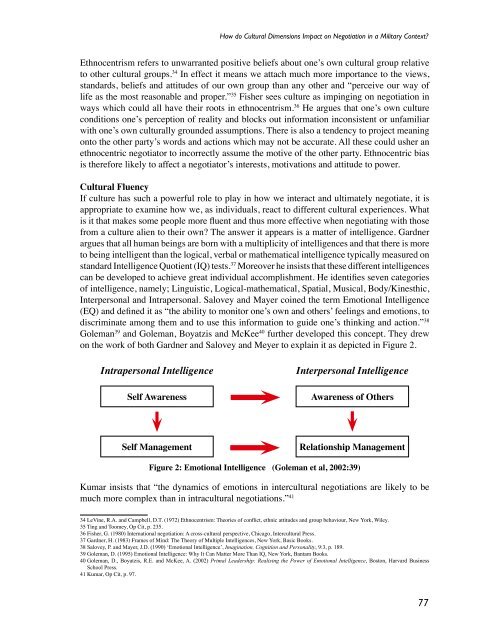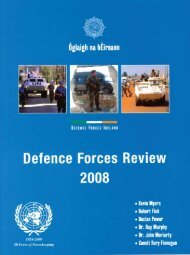How do Cultural Dimensions Impact on Negotiation in a Military Context?Ethnocentrism refers to unwarranted positive beliefs about one’s own cultural group relativeto other cultural groups. 34 In effect it means we attach much more importance to the views,standards, beliefs and attitudes of our own group than any other and “perceive our way oflife as the most reasonable and proper.” 35 Fisher sees culture as impinging on negotiation inways which could all have their roots in ethnocentrism. 36 He argues that one’s own cultureconditions one’s perception of reality and blocks out information inconsistent or unfamiliarwith one’s own culturally grounded assumptions. There is also a tendency to project meaningonto the other party’s words and actions which may not be accurate. All these could usher anethnocentric negotiator to incorrectly assume the motive of the other party. Ethnocentric biasis therefore likely to affect a negotiator’s interests, motivations and attitude to power.Cultural FluencyIf culture has such a powerful role to play in how we interact and ultimately negotiate, it isappropriate to examine how we, as individuals, react to different cultural experiences. Whatis it that makes some people more fluent and thus more effective when negotiating with thosefrom a culture alien to their own? The answer it appears is a matter of intelligence. Gardnerargues that all human beings are born with a multiplicity of intelligences and that there is moreto being intelligent than the logical, verbal or mathematical intelligence typically measured onstandard Intelligence Quotient (IQ) tests. 37 Moreover he insists that these different intelligencescan be developed to achieve great individual accomplishment. He identifies seven categoriesof intelligence, namely; Linguistic, Logical-mathematical, Spatial, Musical, Body/Kinesthic,Interpersonal and Intrapersonal. Salovey and Mayer coined the term Emotional Intelligence(EQ) and defined it as “the ability to monitor one’s own and others’ feelings and emotions, todiscriminate among them and to use this information to guide one’s thinking and action.” 38Goleman 39 and Goleman, Boyatzis and McKee 40 further developed this concept. They drewon the work of both Gardner and Salovey and Meyer to explain it as depicted in Figure 2.Intrapersonal IntelligenceSelf AwarenessInterpersonal IntelligenceAwareness of OthersSelf ManagementRelationship ManagementFigure 2: Emotional Intelligence (Goleman et al, 2002:39)Kumar insists that “the dynamics of emotions in intercultural negotiations are likely to bemuch more complex than in intracultural negotiations.” 4134 LeVine, R.A. and Campbell, D.T. (1972) Ethnocentrism: Theories of conflict, ethnic attitudes and group behaviour, New York, Wiley.35 Ting and Toomey, Op Cit, p. 235.36 Fisher, G. (1980) International negotiation: A cross-cultural perspective, Chicago, Intercultural Press.37 Gardner, H. (1983) Frames of Mind: The Theory of Multiple Intelligences, New York, Basic Books.38 Salovey, P. and Mayer, J.D. (1990) ‘Emotional Intelligence’, Imagination, Cognition and Personality, 9:3, p. 189.39 Goleman, D. (1995) Emotional Intelligence: Why It Can Matter More Than IQ, New York, Bantam Books.40 Goleman, D., Boyatzis, R.E. and McKee, A. (2002) Primal Leadership: Realising the Power of Emotional Intelligence, Boston, Harvard BusinessSchool Press.41 Kumar, Op Cit, p. 97.77
<strong>Defence</strong> <strong>Forces</strong> <strong>Review</strong> <strong>2010</strong>Cultural IntelligenceCultural Intelligence is the ability to engage in a set of behavioursthat uses skills (i.e. language or interpersonal skills) and qualities(e.g. tolerance for ambiguity, flexibility) that are tuned appropriatelyto the culture based values and attitudes of the people with whom oneinteracts. 42“Cultural Intelligence (CQ) 43 is related to emotional intelligence, but picks up whereemotional intelligence leaves off.” 44 One critical element that CQ and EQ have in commonis the need to suspend judgement until enough information is available. 45 Earley and Ang putforward a concept of CQ that seeks to understand individual differences in the ability to adapteffectively to new cultural settings. 46 Ng, Ramaya, Teo, and Wong suggest a generic trainingframework, based on CQ, for cross-cultural education of military leaders. 47 They posit thata CQ based general cultural education would provide the foundation necessary to developcultural competence in all military leaders, enhance mission specific cultural training prior tooverseas service and enable effective cross-cultural learning in a multi-cultural setting. Thisechoes the contention that “cultural intelligence can be developed.” 48The Military NegotiatorHaving examined the literature on the dimensions of culture, it is now time to explore itsrelevance in the specific military context of Peace Support Operations. The followingobservations are drawn from a series of interviews with Irish and international, militaryand non – military, practitioners from across the broad range of Peace Support Operations.My findings confirm the relevance of culture to negotiation and indeed make the distinctionbetween the relevance of the negotiator’s own culture and the culture of other parties as wellas the importance of both national and organisational cultures. Knowledge and awareness ofone’s own culture is the necessary starting point in attempting cross-cultural negotiation inorder to prevent the effect of possible preconceptions and to ensure that, as a peacekeeper oneremains culturally neutral.I contend that attitudes to violence are rooted in culture and linked to emotion. This is a vitalissue for military negotiators who are more likely to operate in an emotional and violentenvironment, particularly at the tactical level. An acceptance of a certain level of threat isregarded as part of a peacekeepers job but Irish <strong>Defence</strong> <strong>Forces</strong>’ culture appears to support anacceptance of a greater level of threat than other military forces. This illuminates a <strong>Defence</strong><strong>Forces</strong> ethos where negotiation is the weapon of first resort, but underlines the personalcourage and professional judgement required in such circumstances.42 Earley, P.C. and Peterson, R.S. (2004) ‘The elusive cultural chameleon: Cultural intelligence as a new approach to intercultural training for the globalmanager’, Academy of Management Learning and Education, 3, p. 89.43 The acronyms CI and CQ are both used in the literature to stand for Cultural Intelligence. This essay follows the convention of CQ, as used by Earleyand Mosakowski.44 Earley, P.C. and Mosakowski, E. (2004) ‘Cultural Intelligence’ Harvard Business <strong>Review</strong>, 82:10, p. 139.45 Earley and Mosalowski, Op cit. Goleman, D. (1998) ‘What Makes a Leader?’ Harvard Business <strong>Review</strong>, 76:6, pp. 93-102. Triandis, H.C. (2006) ‘CulturalIntelligence in Organisations’, Group and Organisation Management, 31:1, pp. 20-26.46 Earley, P.C. and Ang, S. (2002) Cultural Intelligence: Individual interactions across cultures, California, Stanford University Press.47 Ng, K.Y., Ramaya, R, Teo, T.M.S. and Wong, S.F. (2005) ‘Cultural Intelligence: Its potential for military leadership development’, paper presented at47th Annual International Military Testing Association Conference, 8 – 10 Nov 2005, Singapore48 Earley and Mosakowski, Op Cit, p. 146.78
















